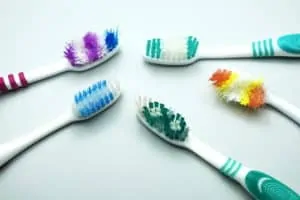
Gum Disease and Heart Disease
We know it may sound strange, taking heart health advice from a dental team, but there’s actually a pretty strong connection between oral health and heart health, and it starts with gum disease. Gum disease, or periodontal disease, occurs when plaque is allowed to build up on teeth, leading to infection. This infection can spread to the bloodstream, causing the body to produce an excess of C-reactive protein (CRP). High levels of CRP can create a whole host of other whole-body concerns including:
- Inflamed arteries
- Blood clots
- Heart attacks
- Strokes
Heart Disease Facts
- Heart disease is the leading cause of death in the U.S.
- It accounts for over 600,000 deaths every year.
- Someone has a heart attack every 34 seconds
- Every 60 seconds, someone dies from a heart disease-related event
Reduce Your Risk & Know the Signs of Gum Disease
The biggest mistake adults make is thinking that just because they received a clean bill of health at their last appointment, they can skip their next dental checkup or cleaning. But the scary truth is, gum disease can start very quietly and without noticeable symptoms. If you do experience any of the following signs, please contact your dentist in Asheboro right away:
- Bleeding when brushing or flossing
- Puffiness or tenderness of the gums
- Halitosis (bad breath)
- Loose teeth
Reduce Your Risk
Besides following tips from the American Heart Association like exercising regularly and avoiding tobacco, you should also follow a proper oral health care routine — visit our Asheboro dental office twice a year, brush twice a day, and floss once a day.
Good dental health is more important than keeping smiles healthy. It can save your life.
Accepting patients from Asheboro, Randolph County, Randleman and beyond.















